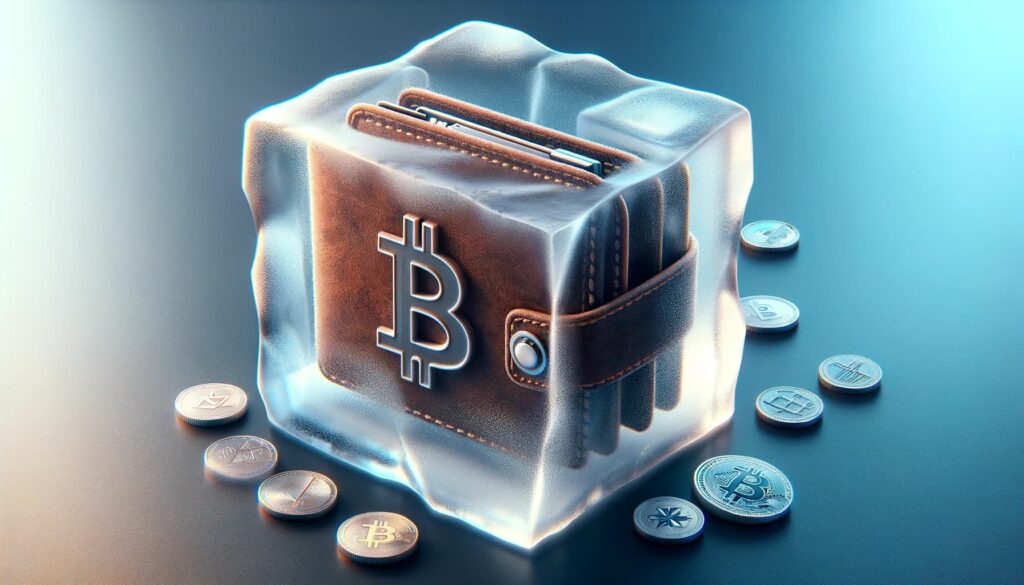Crypto Wallet Protection
Welcome to our latest blog post where we dive into the crucial topic of Crypto Wallet Protection. In the ever-evolving landscape of digital currencies, safeguarding your assets is paramount. Whether you're a seasoned investor or just dipping your toes into the world of cryptocurrency, understanding how to secure your crypto wallets is essential. Join us as we explore key strategies, best practices, and top tools to ensure the safety of your digital assets in this dynamic and often unpredictable realm.
The Importance of Protecting Crypto Wallets
The importance of protecting crypto wallets cannot be overstated. As more and more people invest in cryptocurrencies, the need for security measures to ensure the safety of these investments becomes crucial.

One effective way to safeguard crypto wallets is by using a secure hardware wallet. These physical devices offer an extra layer of protection by storing private keys offline, making it almost impossible for hackers to gain access to them remotely. Reputable exchanges also play a vital role in protecting crypto wallets. Choosing a well-established and trusted exchange reduces the risk of falling victim to fraudulent activities.
Another basic but crucial aspect of wallet protection is using complex passwords. Weak passwords can easily be cracked by hackers, giving them access to your wallet's contents. By creating strong, unique passwords that are a combination of letters, numbers, and symbols, you can greatly enhance the security of your crypto wallet.
Additionally, it is essential to be vigilant about phishing attacks. Hackers may attempt to deceive you into providing your account credentials through emails or fake websites. Being cautious and verifying the authenticity of any communication before sharing your information is crucial in protecting your wallet.
Lastly, keeping your wallet's software updated is crucial for ensuring its security. Developers regularly release updates that address any vulnerabilities or bugs that could be exploited by hackers. By installing these updates promptly, you can minimize the risk of your wallet being compromised.
Protecting crypto wallets is of utmost importance. By utilizing a secure hardware wallet, using reputable exchanges, creating complex passwords, staying wary of phishing attacks, and keeping software updated, one can significantly mitigate the risks associated with cryptocurrency investments.
Types of Crypto Wallets
Crypto wallets are digital tools that allow users to securely store, send, and receive digital currencies such as Bitcoin, Ethereum, and others. With the growing popularity of cryptocurrencies, users must choose the right type of crypto wallet that suits their needs. There are various types of crypto wallets available, each offering different levels of security, convenience, and accessibility. In this article, we will explore the different types of crypto wallets, ranging from hardware wallets to mobile wallets, and discuss their features and benefits to help you make an informed decision. Whether you are a seasoned crypto investor or a beginner, understanding the different types of crypto wallets is essential in safeguarding your digital assets.
Hot Wallets
Hot wallets are a type of cryptocurrency wallet that is connected to the internet, making them easily accessible but potentially more vulnerable to security breaches compared to cold wallets. There are several types of hot wallets, including desktop wallets, web wallets, and mobile wallets.
Desktop wallets are programs that can be downloaded and installed on a computer. They provide users with complete control over their cryptocurrency assets and can be more secure than web wallets or mobile wallets as they are not reliant on third-party servers. However, they are still susceptible to malware or computer viruses, so users need to maintain up-to-date antivirus software and secure their devices appropriately.
Web wallets are online platforms that can be accessed through a web browser. They offer convenience as they can be accessed from any device with an internet connection. However, they are considered less secure compared to desktop wallets as they are vulnerable to phishing attacks and hacking attempts. Users should use strong passwords and enable two-factor authentication to enhance security.
Mobile wallets are applications installed on smartphones or tablets. They provide users with the convenience of accessing their cryptocurrency assets on the go. Mobile wallets generally offer a higher level of security compared to web wallets, as they store private keys locally on the device. However, if the device is lost, stolen, or compromised, it can result in the loss of funds.
In summary, each type of hot wallet has its own advantages and disadvantages in terms of functionality and security. Users should choose a hot wallet that aligns with their specific needs and take necessary precautions to ensure the security of their crypto assets.
Cold Wallets
Cold wallets are offline storage devices used to securely store cryptocurrency private keys. There are two types of cold wallets: paper wallets and hardware wallets.
Paper wallets are a low-tech solution where the user writes down or prints their private keys on a physical piece of paper. They are considered highly secure as they are not connected to the internet, eliminating the risk of online attacks. However, paper wallets are vulnerable to physical threats such as theft, damage, and loss. To enhance security, paper wallets can also include QR codes for easier wallet address scanning.
On the other hand, hardware wallets are high-tech devices specifically designed to store private keys securely. They offer advanced security features, including PINs and mnemonic passphrases. PINs act as an additional layer of protection by requiring a user to enter a PIN before accessing the wallet. Mnemonic passphrases are a series of random words used to generate private keys. In case of device loss or damage, the mnemonic passphrase can be used to recover the wallet and funds.
It is crucial to keep hardware wallets and mnemonic phrases stored in a safe place to prevent unauthorized access. Storing the device in a secure location such as a safe deposit box or a locked safe adds another layer of protection. Similarly, the mnemonic passphrase should be stored in an encrypted format or written down and stored in a separate secure location.
In summary, cold wallets provide a secure offline storage solution for cryptocurrency private keys. Paper wallets offer low-tech security but are vulnerable to physical threats, while hardware wallets offer high-tech solutions with advanced security features such as PINs and mnemonic passphrases. Proper storage of the hardware wallet and mnemonic phrase is essential to maintain the security of the funds.
Mobile Wallets
Mobile wallets have gained popularity due to their convenience and accessibility for daily transactions. These wallets offer intuitive interfaces, making them user-friendly even for those who are not tech-savvy. Users can easily navigate through the wallet's features, such as checking their transaction history, adding funds, and making payments.
One of the significant advantages of these wallets is their convenience for sending and receiving cryptocurrencies on the move. Users can quickly transfer digital assets to anyone with just a few taps on their mobile phones. This feature is particularly beneficial for frequent travelers or individuals who engage in international transactions frequently.
Another essential feature of mobile wallets is their multi-currency support. These wallets allow users to store and manage multiple cryptocurrencies in a single place. This eliminates the need for separate wallets for each digital asset, streamlining the user experience and simplifying portfolio management.
Mobile wallets also prioritize security by incorporating two-factor authentication. This added layer of protection ensures that only authorized individuals can access the wallet. Users receive a unique code or prompt on another device, such as their email or another mobile device, during the login process, making it difficult for unauthorized individuals to gain access.
However, mobile wallets also come with potential risks. As these wallets are connected to the internet, they are susceptible to hacking and phishing attacks. Users must exercise caution by downloading wallet applications only from trusted sources and keeping their devices' operating systems and security software up to date.
Mobile wallets offer a range of features such as daily transaction accessibility, intuitive interfaces, convenience for sending and receiving cryptocurrencies, multi-currency support, and enhanced security through two-factor authentication. While these wallets offer significant benefits, users must remain vigilant against potential risks to ensure the safety of their digital assets.
Crypto Wallet Security
Crypto wallet security refers to the measures taken to safeguard digital assets stored in crypto wallets. A crypto wallet is a software program or a physical device that allows users to securely store and manage their cryptocurrencies.
Key terms essential to understanding crypto wallet security include encryption, private key, and two-factor authentication. Encryption involves the use of complex algorithms to encode sensitive information, ensuring that only authorized parties can access it. Private keys are unique codes that grant access to crypto holdings and must be kept secret to prevent unauthorized access. Two-factor authentication adds an extra layer of security by requiring users to provide multiple forms of identification, such as a password and a code generated by a mobile app.
Crypto wallet security faces several threats including hacking, phishing attacks, malware, and physical theft. Hacking attempts can involve unauthorized access to online wallets or infiltrating the user's device to obtain private keys. Phishing attacks trick users into revealing their credentials through disguised emails or websites. Malware can compromise wallet security by stealing private keys or altering wallet addresses. Physical theft refers to wallets being stolen physically, such as when devices or hardware wallets are misplaced, lost, or stolen.
The risks associated with compromised crypto wallet security can be severe. Loss of funds, identity theft, financial fraud, and reputational damage are some of the potential consequences. Crypto wallet users need to stay informed about the latest security practices, utilize strong passwords, regularly update their software, enable two-factor authentication, and ensure the physical security of their wallets.
Crypto Wallet Protection
Crypto wallet protection is of utmost importance in the ever-evolving world of digital currencies. As the use of cryptocurrency continues to grow, the need to safeguard one's assets becomes increasingly crucial. With the potential for cyberattacks, scams, and theft, it is essential for crypto wallet owners to understand the significance of protecting their wallets from unauthorized access and ensuring the safety of their digital assets. In this article, we will explore the reasons why crypto wallet protection should be a top priority for every cryptocurrency investor and user.
1. Prevention of Unauthorized Access:
One of the primary reasons for prioritizing crypto wallet protection is to prevent unauthorized access to your digital assets. Without adequate security measures in place, criminals or hackers can gain access to your wallet and steal your cryptocurrencies without leaving a trace. A secure crypto wallet with strong encryption and authentication mechanisms can significantly reduce the risk of unauthorized transactions and ensure that only the rightful owner has control over their assets.
2. Protection Against Cyberattacks:
Cyberattacks are a prevalent threat in the digital world, and cryptocurrency wallets are no exception. Hackers are continually developing sophisticated techniques to exploit vulnerabilities in wallets and gain unauthorized access. By implementing robust security measures such as two-factor authentication and secure offline storage, crypto wallet owners can safeguard their assets and reduce the risk of falling victim to cyberattacks.
3. Mitigation of Internal Risks:
In addition to external threats, internal risks pose a significant danger to the security of crypto wallets. These risks include human errors, malware infections, or physical damages to the devices storing the wallets. By regularly backing up wallet data, avoiding suspicious downloads and links, and storing wallets in secure offline environments, cryptocurrency owners can mitigate these internal risks and ensure the longevity and safety of their investments.
4. Peace of Mind:
By prioritizing the protection of their crypto wallets, users can enjoy peace of mind knowing that their digital assets are secure. This peace of mind allows them to focus on investing, trading, and utilizing cryptocurrencies without constant worry about the safety of their funds. A well-protected crypto wallet provides a sense of confidence and assurance, enabling users to engage in the crypto ecosystem with greater ease and security.
The importance of crypto wallet protection cannot be overstated. With the exponential growth of the cryptocurrency market, ensuring the security of one's digital assets is crucial in guarding against unauthorized access and potential losses. By implementing strong security measures, individuals can mitigate the risks posed by cyberattacks, internal threats, and theft, providing themselves with the peace of mind needed to fully participate in the world of cryptocurrencies.
Security Breaches in the Crypto Space
The crypto space has been plagued by security breaches, with crypto wallets being a prime target for hackers. These breaches occur due to common issues related to crypto wallets, such as weak passwords, phishing attacks, and malware.
One vulnerability that crypto wallets face is the risk of a private key being stolen. Private keys are used to access and transfer cryptocurrency funds, so if they fall into the wrong hands, it can result in substantial financial losses for the wallet holder. Additionally, crypto wallets can also be vulnerable to phishing attacks, where users are tricked into revealing their login credentials or private keys on fake websites or through malicious emails.
Digital wallets also face specific security risks, including the possibility of being compromised through malware. Malicious software can be programmed to secretly record keystrokes or capture screenshots, potentially capturing sensitive information like passwords or private keys. Another risk is the use of unreliable or insecure wallet applications, which may have hidden vulnerabilities that hackers can exploit.
To mitigate these threats, it is crucial to implement protective measures for crypto wallets. This includes using strong and unique passwords, enabling two-factor authentication, and regularly updating wallet software to patch any security vulnerabilities. Users should also be vigilant against phishing attempts, ensuring they only provide sensitive information on legitimate and secure websites. By taking these protective measures, individuals can fortify their crypto wallets and reduce the risk of security breaches in the crypto space.
Examples of Past Security Breaches
Cybersecurity breaches have become an all too common occurrence in the digital age, continually reminding us of the vulnerabilities inherent in our increasingly interconnected world. These breaches not only compromise sensitive data, but also undermine public trust in the security of online platforms and systems. In this article, we will explore a few notable examples of security breaches from the past, shedding light on the devastating consequences they had and the lessons we can learn from them. From large-scale data leaks to sophisticated hacking incidents, these examples serve as important reminders of the constant need to prioritize and enhance cybersecurity measures.
Risks Associated with Unprotected Wallets
When it comes to cryptocurrency wallets, protecting them adequately is of utmost importance. Unprotected wallets expose users to significant risks and potential vulnerabilities in the digital world.
One of the key risks associated with unprotected wallets is the potential for unauthorized access. Without sufficient security measures in place, malicious actors may gain access to the wallet's private keys or credentials, enabling them to steal the stored cryptocurrencies. This can lead to substantial financial losses for wallet owners.
Inadequately safeguarded wallets are also vulnerable to hacking threats. Cybercriminals employ various techniques like phishing, malware attacks, or exploiting software vulnerabilities to target and compromise crypto wallets. Once compromised, these wallets can be used to steal funds or manipulate transactions, posing substantial risks to users and their investments.
Moreover, unprotected wallets are susceptible to social engineering attacks. Scammers may trick individuals into revealing their wallet credentials through tactics such as impersonating customer support or offering fraudulent investment opportunities. Consequently, users may unknowingly provide access to their wallets, leading to the loss of funds.
To mitigate these risks, it is crucial to prioritize cybersecurity measures for cryptocurrency wallets. Utilizing secure and reputable wallet providers, enabling two-factor authentication, and regularly updating software versions are key steps to enhance wallet security. Additionally, practicing caution while interacting with online platforms and being aware of potential phishing attempts can help safeguard wallets and protect users from potential threats.
The Prevalence of Theft, Loss, and Hacking
In today's interconnected world, the prevalence of theft, loss, hacking, and other security breaches has become a growing concern. As technology advances and our reliance on digital platforms increases, so does the vulnerability to these risks. The repercussions of such events can be far-reaching and bring about serious consequences, affecting individuals, businesses, and society as a whole. It is crucial, therefore, to understand the nature of these threats, take proactive measures to protect ourselves, and stay informed about the latest security practices to mitigate the potential risks.
Protecting Your Digital Assets
Protecting your digital assets, including your crypto wallet, is of utmost importance to safeguard your investments and prevent potential breaches or hacking attempts. Listed below are key methods and strategies to implement for strong crypto wallet security.
1. Back up your wallet: Regularly back up your wallet and store the backup in a secure location. This ensures that, in case of theft or hardware failure, you can restore your wallet and access your funds.
2. Implement strong security measures: Enable two-factor authentication (2FA) and set a strong, unique password for your wallet. Avoid using easily guessable details or reusing passwords. Additionally, consider using biometric authentication methods like fingerprint or facial recognition for added security.
3. Use hardware wallets: Consider storing your cryptocurrencies in hardware wallets, which are physical devices providing offline storage and strong encryption. These wallets provide an extra layer of protection against online threats as they keep your private keys offline and out of reach from hackers.
4. Practice safe online habits: Beware of phishing attacks and use caution when clicking on links or downloading files. Be cautious of sharing wallet addresses publicly or with untrusted sources. Encrypt your internet connection using a reliable virtual private network (VPN) while accessing your wallet remotely.
5. Stay informed about security threats: Regularly educate yourself about the latest security threats and updates. Subscribe to trusted sources for news and updates within the cryptocurrency community. Staying informed will help you proactively address any potential vulnerabilities.
Protecting your digital assets requires taking proactive steps such as backing up your wallet, implementing strong security measures, utilizing hardware wallets, practicing safe online habits, and continuously staying informed about security threats. By following these strategies, you can enhance your crypto wallet security and minimize the risk of breaches or hacking attempts.
Why it is Crucial to Protect Your Crypto Assets
It is of utmost importance to protect crypto assets due to their vulnerability to theft. Unlike traditional banking systems, where account holders have some level of protection against fraudulent activities, crypto assets are stored in digital wallets that are susceptible to hacking and unauthorized access.
The consequences of not protecting these assets can be severe. Once stolen, it is incredibly difficult to recover stolen crypto funds. The decentralized nature of cryptocurrencies makes it nearly impossible to trace and retrieve stolen funds, leaving the owner at a significant loss. Moreover, there is no central authority or regulatory body to hold accountable for any wrongdoing, further complicating the recovery process.
To effectively protect crypto assets, some basic measures can be taken. Firstly, utilizing strong and unique passwords for digital wallets is crucial. Additionally, two-factor authentication adds an extra layer of security by requiring a second form of verification, such as a personal device or email, to access the wallet. Regularly updating and maintaining security software on devices is also vital to prevent malware and other threats.
Furthermore, storing crypto assets offline in a hardware wallet, also known as cold storage, provides an additional layer of protection. This method, which involves keeping the wallet's private keys offline, reduces the risk of unauthorized access.
Overall, due to their vulnerability to theft and the difficulty in recovering stolen funds, it is crucial to take adequate measures to protect crypto assets effectively. By implementing the basic security measures and being cautious of potential threats, individuals can mitigate risks and ensure the safety of their digital assets.


